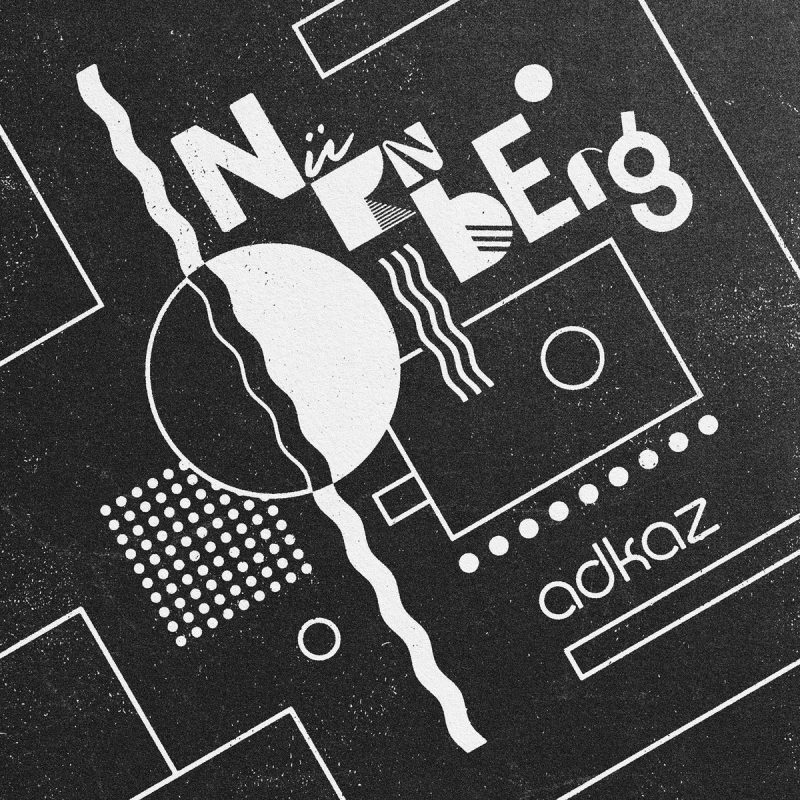Every day I walk on fragments
I am trying to return here.
And all around are dead flowers,
That they can’t reach for the sun.
Nürnberg, a post-punk duo comprising Yury Luhautsou (vocal, bass, synths) and Aleh Sautin (guitar), hail from Minsk, Belarus. Today, the band announces the release of Adkaz, their third studio album, via Young and Cold Records. The title, translating to “answer” in English, hints at the thematic richness and profound exploration found by exploring within the self.
Formed in 2016, Nürnberg’s artistic vision is deeply rooted in the melancholic essence of post-Soviet urban landscapes. Their music reflects an exploration of existential themes, social issues in today’s industrial societies, and the often overwhelming pressure and fatigue of modern life. Yet, amidst this sombre reflection, their work also resonates with the essential human capacities for love and compassion.
Nürnberg’s sound, characterized by a moody ambience, is infused with a palpable energy, akin to Gang of Four, Chameleons, Scars, and Killing Joke. Their compositions are imbued with a sense of melancholy, gloom, and desolation, all while being adorned with shimmering reverb and bittersweet melodies. One feels a sense of compassion nestled within this fatalistic dance music built on kick and clap drum beats, resonant, melodic basslines, and piercing, wistful guitar leads that intertwine with Luhautsou’s emotive vocals.
Moving beyond their classic post-punk origins, their new album introduces a compelling new buoyancy to their sound, significantly different from their previous work. Thematically, record reflects on individual experiences during significant historical shifts, addressing themes of dislike and mental health challenges pertinent to contemporary Eastern European life, along with insights into love and personal relationships. Adkaz acts as a coherent progression from their earlier albums to what lies ahead, signaling a deliberate and thoughtful shift in their musical direction.
The opening song, Insomnia, is an old-school post-punk gem with its melodic guitar and bass. The ardent vocals flawlessly convey the ache and longing for a lost love, feeling their absence profoundly and experiencing them only in the realm of dreams. The realization dawns each morning that these encounters are merely figments of their imagination.
The next song, Horad, evokes that feeling of heading towards the western sunset that Ennio Morricone conjures up through his film scores, an atmosphere that has always pervaded post-punk. Lyrically, the song conveys a sense of persistent gloom and isolation in a town devoid of sunlight, where both the city and its inhabitants are engulfed in restlessness. A deep desire to share the night with someone special persists despite the bleak backdrop.
In “Adkaz,” a pervasive feeling of tedium and detachment from the day-to-day emerges, encapsulating a quest for insight into feelings of being singled out. The song’s guitar riffs and vocal tones allude to the iconic sounds of Asylum Party and Low-Life, while the musical arrangement imbues the track with an emotional depth and a nostalgic essence that is quintessentially coldwave, reflecting the genre’s unique blend of melancholy and introspection.
Imbued with more synths, most notably a catchy bass, Miesca, through its ensnaring vocals, expresses a longing for gentle connection and clarity. The song reflects on enduring personal struggles and a surrounding environment where hope, symbolized by flowers unable to reach the sun, seems distant.
Adliha is even more synth-driven, evoking the darker synth-pop of New Order. The song describes a tumultuous relationship marked by conflict and emotional distance, likened to historical events like the Cold War and the Berlin Wall; retreating into isolation as they endure deep emotional pain. Despite the lack of resolution or victory, there’s a glimmer of hope for change…a ‘Prague Spring.’
Vada transforms into an ethereal dance of dreams, where the elevated vocal harmonies evoke a realm of solitude and deep reflection, akin to a longing to immerse oneself in the symbolic embrace of water’s depths. This voyage mirrors a detachment from another, whose proximity and touch have faded away. Here, water acts as a cleansing force, washing away imperfections and beckoning towards a profound self-discovery, extended as an open invitation to the other.
Highlighting the overwhelming nature of fear that can paralyze and consume one’s mental well-being, Strach is a captivating composition where a precipitous melange of guitars, vocals, and synths masterfully conveys the terror of a life overshadowed by such dread. The track delves into the debilitating effects of fear, probing the extent of its power to erode and confine the spirit and articulating the perplexity surrounding its all-consuming presence.
In the vibrant and entrancing melody of “Pacalunak,” driven by an Eastern European guitar flair, the lyrics unfold a tale of unfulfilled affection and the yearning for something beyond mere friendship. The song is anchored by a catchy vocal hook that adds infectious layer to its emotional depth. Here, one individual’s emotional detachment is poetically depicted as a layer of snow upon their soul. Despite deep emotions and a longing to overcome these emotional divides, the possibility of romantic entanglement is decisively dismissed by the other, casting a shadow of definitive rejection and closure over their interactions.
Listen to the album below and order here:
Nürnberg’s third studio album, Adkaz, is a compelling testament to the resilience of post-punk, skillfully weaving together the melancholic textures of post-Soviet urban landscapes with the band’s unique sonic identity. Rooted in the traditions of both Eastern and Western post-punk legacy acts, such as Gang of Four, Scars, Chameleons, Killing Joke, and KINO, the album nevertheless asserts its distinctiveness through its deep engagement with the existential and social undercurrents of contemporary Eastern European life. The themes explored in the album—ranging from the ache of lost love in “Insomnia” to the quest for connection amidst desolation in “Miesca” and the terror of consuming fear in “Strach”—are not just reflections of individual experiences but resonate with broader historical shifts and mental health challenges. Through its moody ambience, resonant melodies, and emotionally charged vocals, Adkaz stands as a poignant narrative of resilience, introspection, and the perennial human quest for love and understanding, firmly planting its roots in the rich cultural soil of Nürnberg’s Belarusian heritage, making it a unique and evocative addition to the post-punk canon.
Adkaz was recorded with Raman Kamahorcaŭ (Molchat Doma) band and with sound engineer Andrej Babroŭka. The striking cover and artwork for the album was created by Jonathan Sirit (Belgrado).
Follow Nürnberg:
Instagram
Spotify
Facebook
YouTube
The post A Search for Meaning and Connection — Belarusian Post-Punk Duo Nürnberg Look Within in Their New Album “Adkaz” appeared first on Post-Punk.com.




